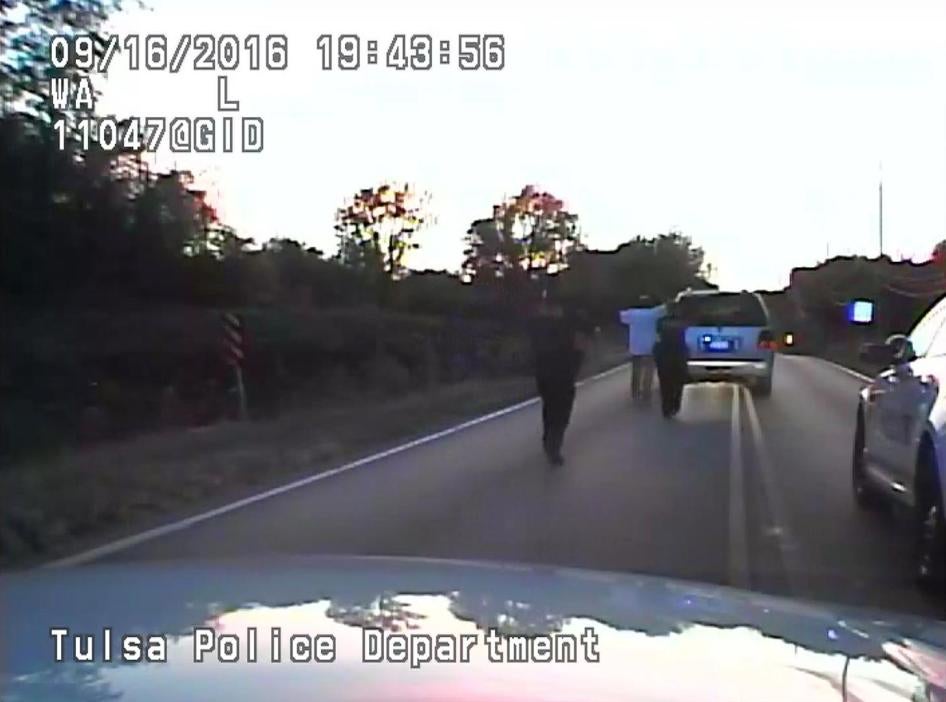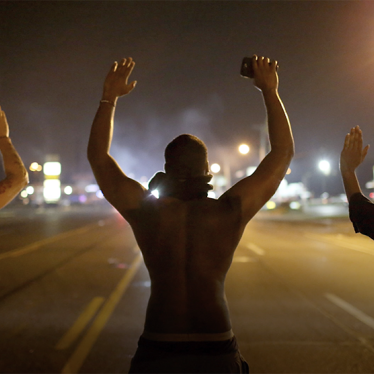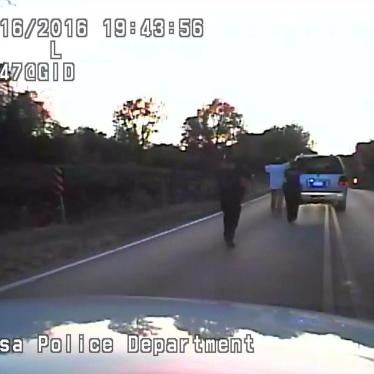|
Fact Sheet
Policing Reform in Tulsa
Summary of Findings from Human Rights Watch’s Report “‘Get on the Ground!’: Policing, Poverty, and Racial Inequality in Tulsa, Oklahoma”
In the wake of high-profile killings by Tulsa Police, including the killing of Terence Crutcher, Tulsans have advocated for reform to address racial bias and police violence. Mayor Bynum and other city leaders have acknowledged the call for change and have made efforts in response. However, so far, the reforms have been mild and raise questions about their potential effectiveness.
Community Policing Commission Recommendations
Reforms have centered around the concept of “community policing.” Bynum appointed the Tulsa Commission on Community Policing to spearhead his reform initiative. In March 2017, the Commission issued 77 recommendations, modeled after the Obama administration’s “Task Force on 21st Century Policing.” The recommendations address a broad range of policing issues from building trust to oversight to officer wellness. They promote some very worthwhile ideas, like implementing restorative justice strategies in schools and establishing multi-disciplinary teams to address complex public safety problems.
Some of the recommendations appear targeted at educating the public on policing to improve the department’s image, like expanding the Citizens Police Academy, conducting surveys to measure public trust or engaging with the 1921 Tulsa Race Riot Centennial Commission “to tell the story of the evolution of the Tulsa Police Department.”
A large percentage of the recommendations suggest that the department “should continue” what it is already doing. It “should continue” collecting and maintaining data about detentions. It “should continue to collaborate with community members to develop policies and strategies….” It “should continue” its de-escalation training. The “should continue” language is pervasive throughout the recommendations and reflects complaints that the department is not willing to make significant changes.
Many of the recommendations are so vague that it is impossible to measure their application. For example, one recommendation said the department should “provid[e] further transparency” and “work harder on procedural justice principles,” without defining any metrics for meeting these goals. Even some of the more specific recommendations lack comprehensive implementation. The Commission said that every officer should receive “implicit bias training.” Instead of engaging in long-term, intensive training with an outside expert, the department hired someone to train in-house trainers who will teach the rest of the officers. The 77 recommendations do not provide an adequate path to reform.
Oversight and Accountability
Local advocates, especially The United League for Social Action (TULSA), have prioritized creating an independent oversight body that would improve accountability of officers and the department to the community. Past efforts to establish such a body have failed.
The 77 recommendations have a section on “oversight,” but only suggest “advisory boards” that lack the power or independence to hold the department accountable. More recently, Mayor Bynum has proposed an “Office of the Independent Monitor” (OIM), which he has indicated is intended to address some of the shortcomings of the 77 recommendations. The OIM would 1) review, but not participate in, Internal Affairs investigations of force incidents; 2) make policy recommendations related to community policing; and 3) engage in citizen outreach. However, the OIM’s lack of subpoena power, inability to participate in investigations, and reliance on Internal Affairs to provide information about incidents may defeat its oversight function and undermine its authority to address problems. It will also rely on the cooperation of the police department and the city’s political leadership.
Community Policing and Expanding the Police Force
The most tangible change in policing policy since the killing of Terence Crutcher has been the Tulsa Police Department’s commitment to greatly expand the number of officers on the force. They have justified this expansion at times by saying that more officers will provide more time for community engagement that is at the core of their vision of “community policing.”
This expansion of the force raises questions about “community policing” in Tulsa. The first question is: without accountability and oversight structures and without a significant change in the culture of the department and how they operate, what reason should Tulsans have to believe that more officers will improve policing? Without those changes, more officers will most likely result in more of the stops, citations, arrests, and force incidents that disproportionately impact black residents and poor people and have led to calls for change. More officers will likely result in more court debt owed by poor people.
The second question is: how will the addition of more police overcome the fact that so many of the societal problems that contribute to crime and undermine quality of life in Tulsa are not solved, and are often made worse, by policing? Poverty fuels crime. Policing focuses on the poorest areas of Tulsa. Even with a “community policing” mentality, the officers’ job is to make arrests and give tickets. More people going to jail or owing court debt will not improve the quality of life. An investment in education, community economic development, affordable housing, mental health care, youth programming, will have an impact on crime while uplifting poor communities.
Reform Recommendations
Human Rights Watch echoes the call for an independent police oversight body with power to access records, to conduct investigations and to impose discipline. There should be detailed reporting requirements so policing outcomes can be fairly monitored. The department should develop practices that discourage easily abused techniques, like pretext stops or pressuring consent to conduct searches.
Tulsa, the county and the state should promote public safety by prioritizing the following over adding more officers: maintaining a functioning support system for people with mental health conditions, investing in community-based economic development in poor neighborhoods, developing affordable housing including housing with services for people in need, investing in education from pre-school through college and job training, and providing drug treatment for those in need.
The state and local jurisdictions could re-structure their system of fees, fines, and court costs so that poor people are not caught in a cycle of debt, warrant, and arrest; Tulsa Police could create a mechanism to summons to court, instead of arrest, those with arrest warrants for failure to pay court debt.
Your tax deductible gift can help stop human rights violations and save lives around the world.
Region / Country
Most Viewed
-
June 3, 2025
“They’re Ruining People’s Lives”

-
January 25, 2024
“We’re Dying Here”

-
April 27, 2021
A Threshold Crossed

-
November 25, 2019
A Dirty Investment

-
November 19, 2012
Losing Humanity





